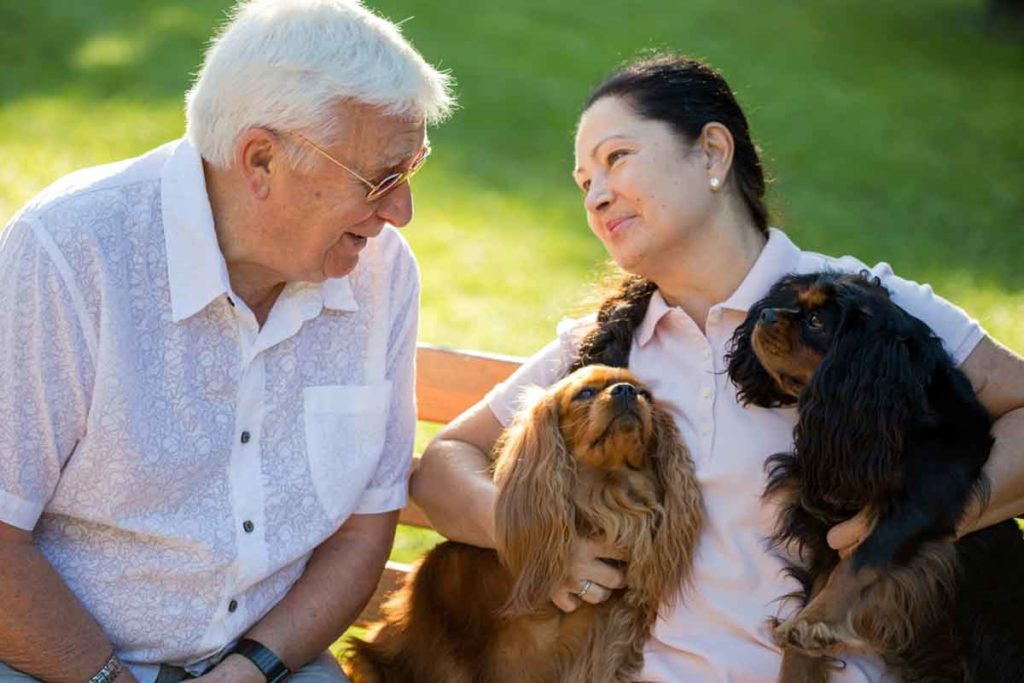Owning a dog can be rewarding and enjoyable at any stage of life. Senior citizens can uniquely benefit from having a furry friend. The elderly population also has unique needs and specifications for dogs that may best suit their lifestyle. With these parameters in mind, some breeds are better for seniors than others.
Table of contents
Benefits of dog ownership
When it is the right fit, pet ownership is good for you! According to a special health report from the Harvard Medical School, having a canine companion has all kinds of health benefits. This is particularly true for seniors.
- Increases physical activity – Dogs need exercise and depend on their people to give them opportunities for activity. This could be multiple daily walks around the neighborhood or simply getting up to let your pup into the backyard. Regardless of the intensity, dogs get owners active. Exercise is great for both physical and mental health!
- Reduces stress – Research shows that being around animals lowers cortisol levels. Cortisol is responsible for stress responses in our bodies. Having a dog reduces stress!
- Improves cardiovascular health – Canine companionship lowers both blood pressure and cholesterol levels. With this, dog parents are also less likely to suffer from heart attacks.
- Increases socialization – If you want to meet people, get a dog. Having a pup forces you to get out into the world. Your furry friend is also likely to draw attention from people and other dogs and is a great icebreaker. We’re social creatures, so having an excuse to interact with people is healthy!
- Provides structure – Dogs thrive on regular routine and structure. Having a pup is a responsibility—they depend on us for so much. Pet parents know that they have to get up each morning to take care of their pooch, which can give owners a healthy sense of purpose.
- Reduces loneliness and isolation – Not only does dog ownership help you meet people, but simply having a dog in the house helps you feel less lonely. This is particularly important for seniors, who are prone to isolation-related depression. Dogs always offer a great listening ear and a warm cuddle!
Factors for seniors to consider
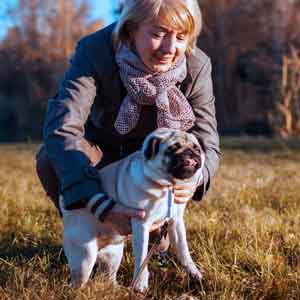
Just like any prospective dog owner, senior citizens have specific restrictions for their dog’s characteristics and traits. We all want the best fit for our pup, so it’s important that your dog also thrives with your lifestyle and pet parent abilities. There are some dog breeds that may be a better fit for seniors than others. That being said, any breed of dog is good for older people if they mesh with their abilities, likes, and lifestyle. Important things to consider for dog ownership as a senior include:
- Energy level – Older people are less likely to be able to keep up with a dog who needs hours of rigorous daily exercise. There’s typically an option to hire a dog walker, but that takes money and limits your bonding time with your pooch. Seniors should consider how much activity their pup requires. High energy dogs can not only be physically demanding, but they can be a falling hazard if they are running around underfoot. Prone to mobility and stamina limitations, older people may consider dogs who need only short walks. Some very small dogs can even get enough exercise just in the house.
- Size – Generally, smaller dogs are better for older people. Even if they jump or run, small dogs are easier to control. They are also portable and easily bathe in the sink. There are some large breeds that are docile and low energy, but bigger dogs tend to be physically overwhelming. This can pose a risk to seniors if they jump, run, or need assistance moving. Dog size also matters when it comes to living arrangements. Seniors who live in smaller homes do not have space for a large dog. Smaller dogs take up less valuable space and tend to need less room for burning energy.
- Temperament – We know that all dogs are unique and prospective owners should get to know their individual dog before making any decisions. Some breeds, however, are more likely to have temperaments that mesh well with senior owners. These dogs should be friendly, gentle, and generally easy-going companions who simply want to keep you company. The last thing an elderly person needs is an aggressive, anxious, or otherwise poorly behaved dog.
- Grooming needs – For dog ownership as a senior citizen, it is all about low maintenance. It’s important to consider how much a dog will shed and need trims. Excessive shedding can require constant brushing, endless house cleaning, and lots of trips to the groomers. Dog size matters here, too. Grooming a small dog is one thing, but grooming a large dog is another.
- Age – Although not specific to breeds, dog age can be an important factor to consider when getting a dog as a senior citizen. Very old dogs often have their own challenges with mobility and health. However, adult dogs are a perfect fit for a senior owner. Adult dogs are more likely to be housetrained and socialized. They are also more likely to be calm and have more predictable behavior. Puppies can be demanding in these respects.
Best dog breeds for seniors
Here are 10 of the best dog breeds for senior owners:
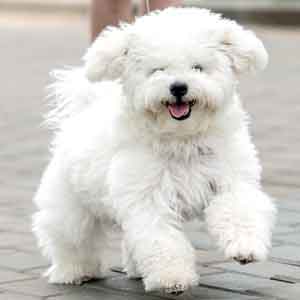
Bichon Frise
This fluffy little dog is happy and affectionate, making them great companions. These pups weigh between seven and 12 pounds, so elderly owners should be able to easily handle them when necessary. Bichons tend to be relatively easy to train and only need moderate daily exercise. With an easy-going temperament and low-maintenance grooming needs, these dogs are perfect for seniors.
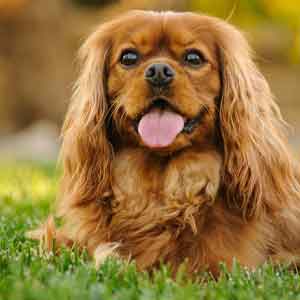
Cavalier King Charles Spaniel
These dogs are affectionate and adaptable, and happiest while they’re snuggling up next to you. Easy to handle and train, they typically weigh between 11 and 18 pounds. Cavaliers have moderate grooming needs, but nothing more complicated than regular brushing and ear cleaning. They are often noted as well-suited for apartments, as they require little exercise.
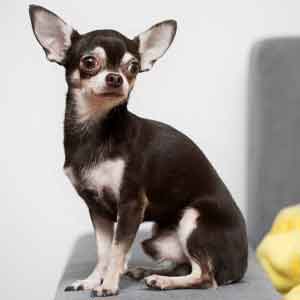
Chihuahua
Chihuahuas are little dogs full of big personalities. You will never be bored or lonely with these dogs. They are loyal companions and lovable lap dogs. Their activity and grooming needs are minimal. Chihuahuas tend to be skeptical of strangers and children, so some training and positive socialization experience is needed.
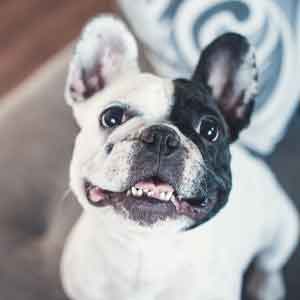
French Bulldog
Frenchies are happy-go-lucky little dogs with minimal grooming needs. They usually weigh between 19 and 28 pounds. Puppies and younger French bulldogs may be energetic, but the breed doesn’t have much endurance and always enjoys time relaxing on the couch. Frenchies are prone to skin issues and health concerns associated with being brachycephalic, or short-snouted.
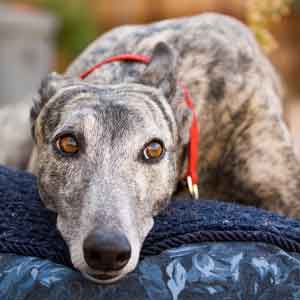
Greyhound
Although on the larger side and known for their speed, Greyhounds actually prefer to spend most of their time lounging. They typically weigh between 60 and 80 pounds, but are gentle, making them easy to train and handle. Seniors looking for a larger dog who can keep up with an active lifestyle while also enjoying downtime should consider a Greyhound. Retired racing greyhound adoption is a popular option in the US, with many adoption organizations operating throughout the country.
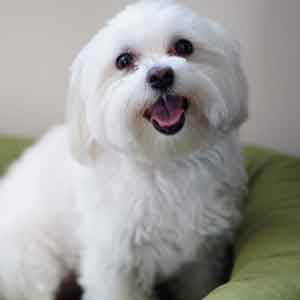
Maltese
These little lap dogs enjoy spending time with their owners and going on short, easy walks. They are relatively easy to train and handle, as they only weigh about five pounds. Maltese pups require regular trips to the groomer, but daily maintenance around the house is minimal. This makes them one of the best dog breeds for seniors.
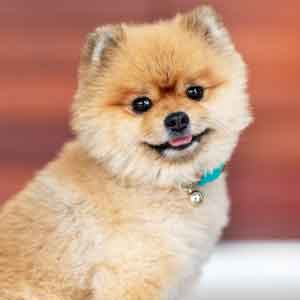
Pomeranian
Weighing no more than seven pounds, Pomeranians can be carried in your bag! These tiny dogs are affectionate and happy companions. They love nothing more than napping in your lap and playing with their toys. Grooming and activity needs are minimal.
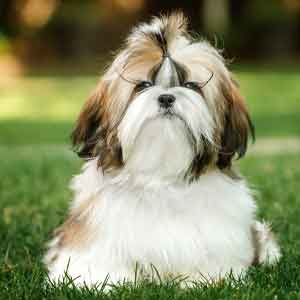
Shih Tzu
These easy-going, loyal companions are popular small dogs maxing out at 16 pounds. Shih tzus are known to be confident and sometimes stubborn, but are generally easy to train and get along with everyone. They’re perfect for smaller homes and only require occasional grooming. Shih tzus are susceptible to developing eye and skin issues, as well as health concerns associated with their smooshed snouts.
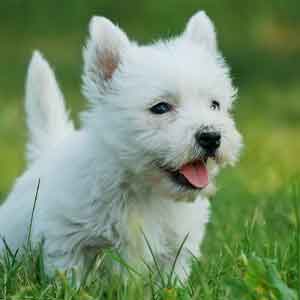
West Highland White Terrier
Westies are great family and companion dogs. They usually weigh between 13 and 20 pounds, so are small but not as tiny and fragile as some other toy breeds. West Highland White Terriers are very friendly and intelligent, quick learners. Westies love to be around their people, playing games and cuddling. They require some but not extensive grooming.
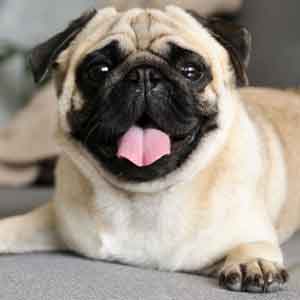
Pug
Pugs are incredibly loving and affectionate, and have a great sense of humor. They usually match their owner’s energy level and were bred as content lapdogs, making them excellent companions. Pugs are particularly food motivated and can be prone to becoming overweight. Monitoring eating habits and maintaining a routine of moderate exercise will help keep this hungry pup healthy. Grooming requirements are nearly nothing, making maintenance a breeze.

